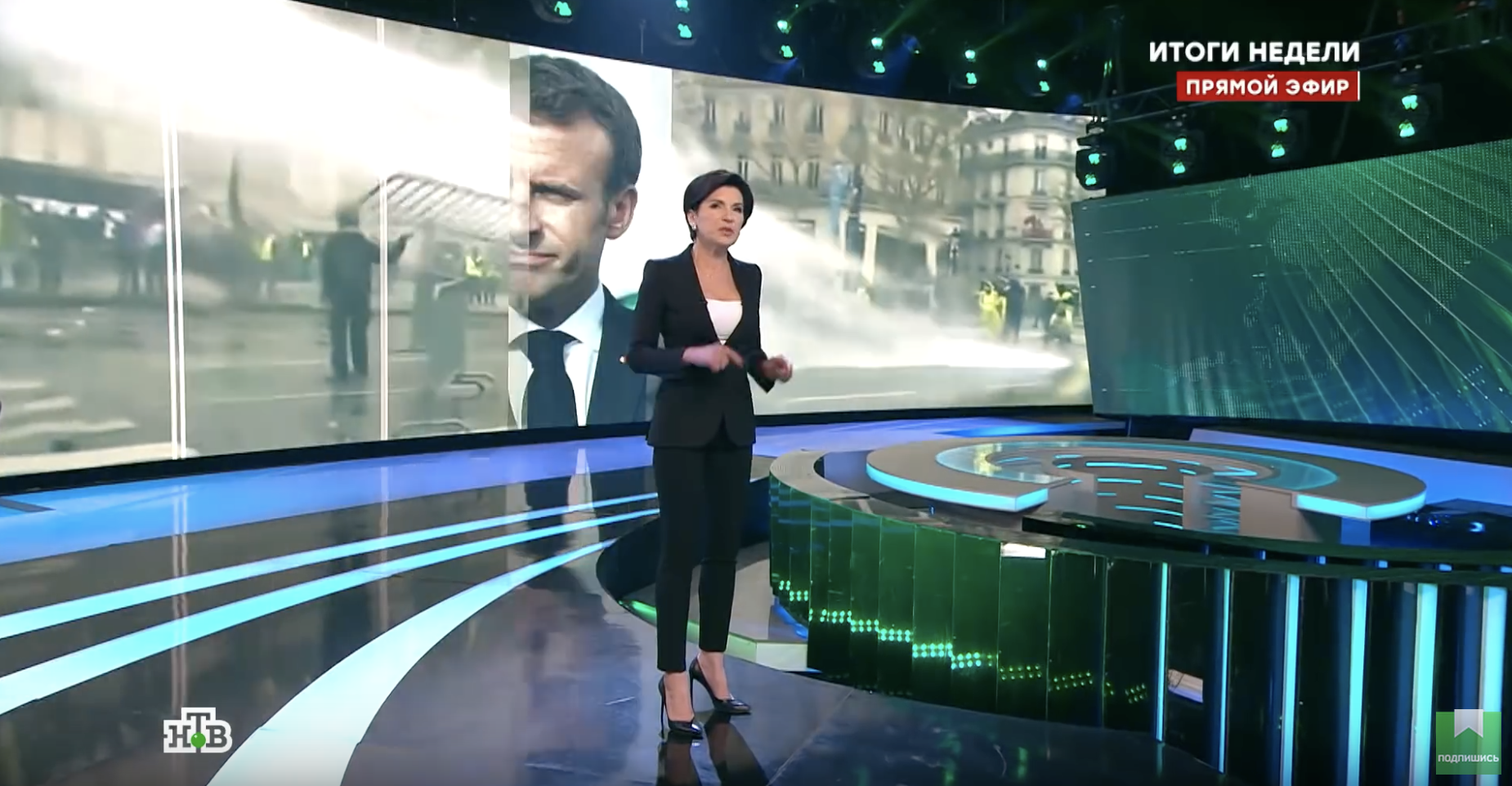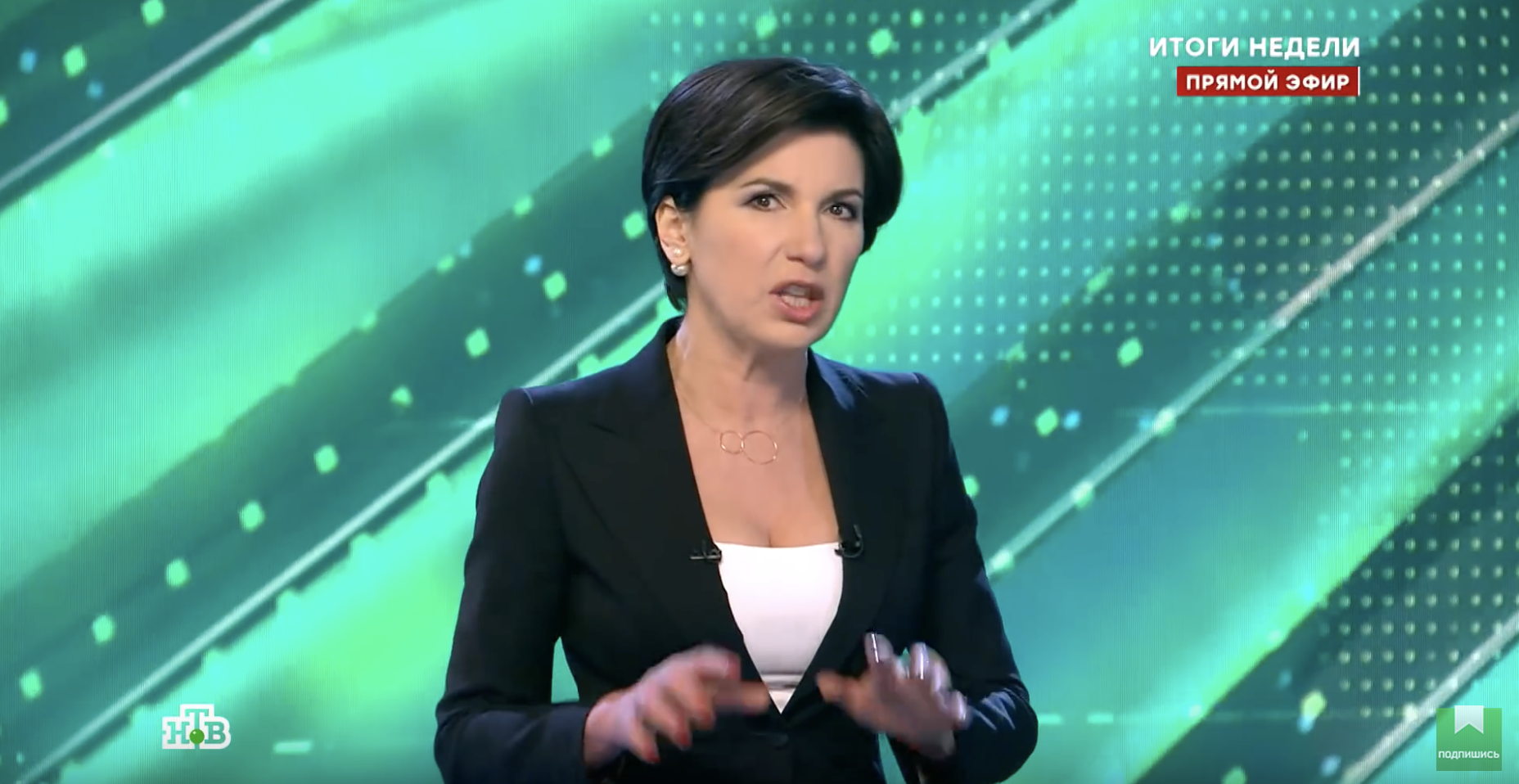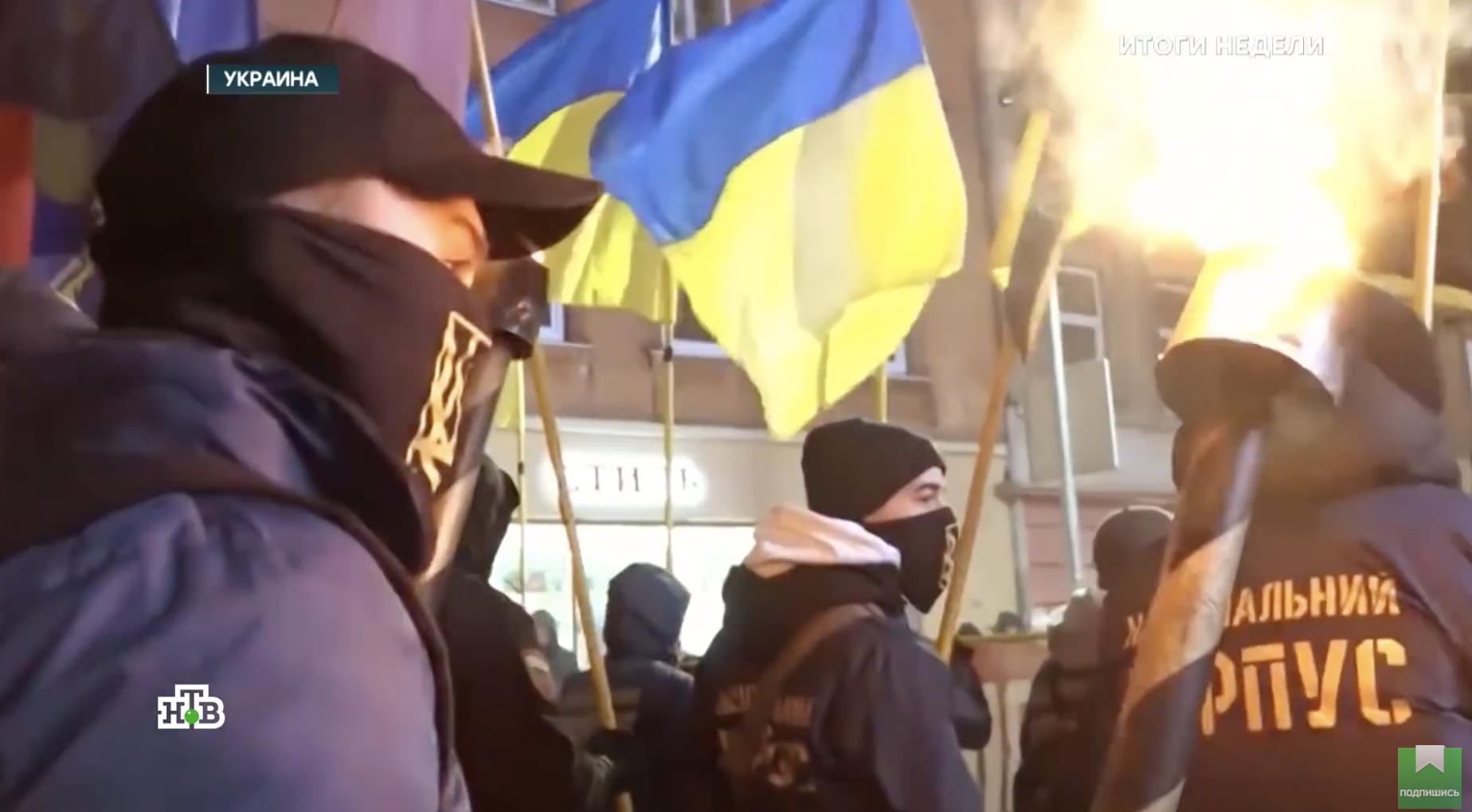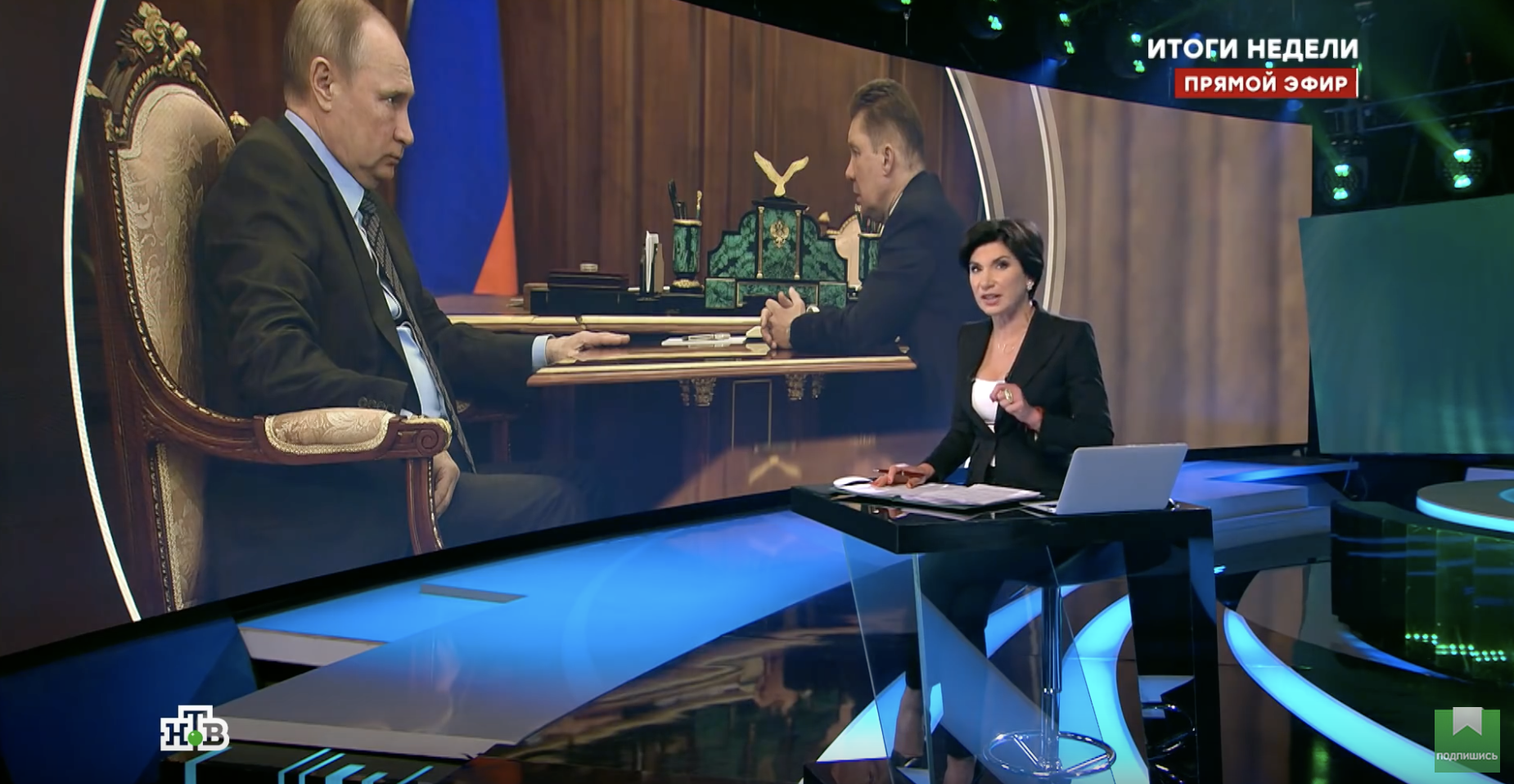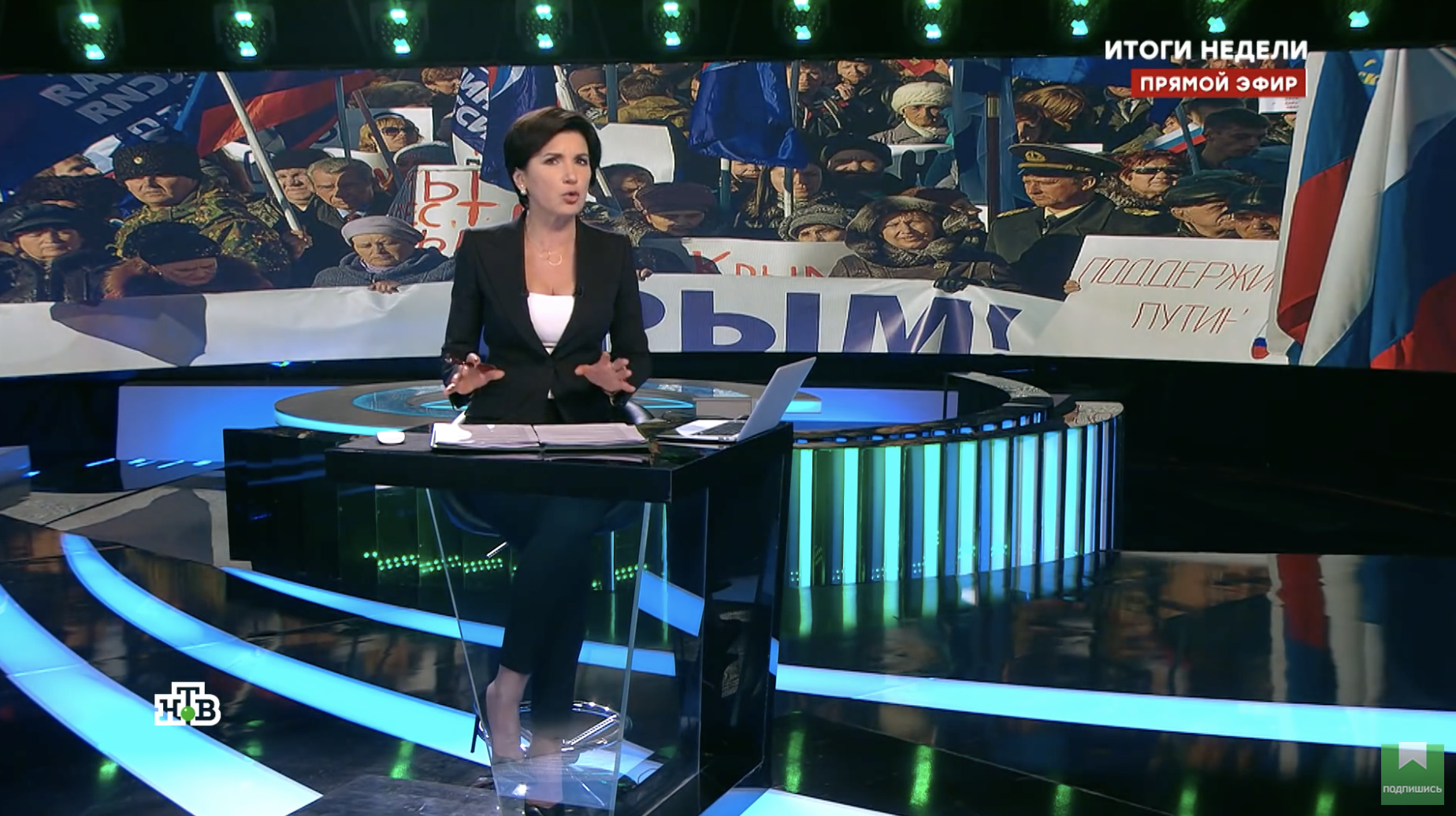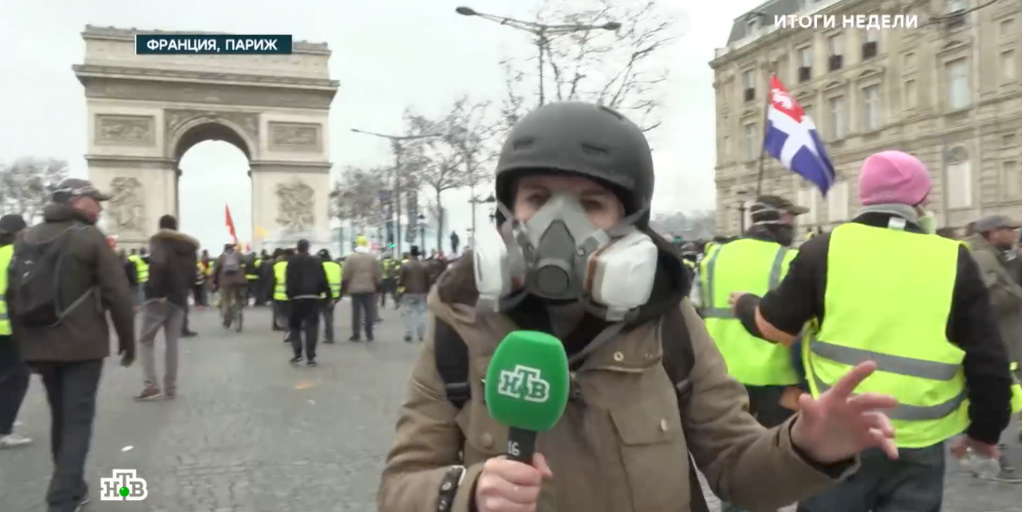
What does the world look like through the lens of Russian TV? How is the news framed on the nationwide networks? Which emotions and attitudes are communicated by the hosts?
We looked for answers in a typical flagship programme, Itogi Nedeli (“The Outcome of the Week”), which was broadcast on 17 March 2019 on one of Russia’s largest TV channels, NTV. Here is what we found.
“There are no safe places left anymore”
NTV host Irada Zenaylova opens her Sunday night show with a fast-paced walk towards the camera.
On her backdrop, there are videos showing the Christchurch terrorist’s recordings, followed by images from a commemoration of SS legionnaires in Riga and confrontations between police and “yellow vests” in Paris.
Zenaylova speaks in a slightly hoarse staccato voice supported with sharp hand gestures. Highly dramatic music accompanies her speech:
“Our main problem – one which we are apparently unable to solve – is how to live next to those who have different views, skin colour or faith. For some reason, coexistence has become old-fashioned.”
Zenaylova makes almost no pauses between her sentences when she speaks, and does not smile. Her words are supposed to frame and suggest an understanding of everything that will follow in the next hour and ten minutes of current affairs reporting in her show:
“For some reason, everyone insists on being right, and does not hesitate to be cruel. Yes, it would be nice only to talk about what is happening at home; but with the advent of the internet, problems are no longer ‘their’ problems or ‘our’ problems; no dangers can be called ‘near’ or ‘far’ any more.”
At this point, the camera moves closer to Zenaylova, as she continues her introductory speech:
“What has happened to our neighbour may come to our house tomorrow; and we must be prepared not to let evil into our house. We ourselves have made the world become like this; so now we must also answer how we are supposed to live in it. This week has shown that there are no safe places left anymore. What happened in the small New Zealand town of Christchurch is nothing but a sign of a terrible misfortune for us all, one which is moving towards all of us; this tragedy is not an isolated event.”
Click on the video or follow this link to see – and hear – how NTV opened it Sunday night current affairs programme
A tour of turmoil in the world
In the course of the rest of the programme, viewers are told about the recent terror attack in New Zealand, which NTV links to extremism throughout the West.
We hear about a remembrance rally for Latvian SS legionnaires held in Riga; about yellow vest riots in France; and about Brexit and the prospect of Scottish independence.
Catastrophic scenarios for Ukraine
A long part of the programme is devoted to the upcoming elections in Ukraine, including a description of a possible post-election scenario in in which Ukrainian territory can be torn apart by neighbouring nations.
We hear about the annexation of Crimea, including a reference to the claims about American plans to build a military base on the peninsula.
Viewers are also told stories about cases of misconduct by US soldiers and other problems caused by the US army’s presence in different parts of the world.
National news at the end
Then – and only then – after almost 45 minutes of international stories – does Russia begin to appear.
First briefly, beginning with the message that even international observers acknowledge that “Russia is winning the sanctions war”.
Then, towards the end, in the form of footage of a meeting between Gazprom director Alexey Miller and president Putin. Mr Miller reassures the president of the benefits which Gazprom has brought to ordinary Russians. (The TV channel, NTV, is owned by Gazprom, which is itself controlled by the Russian state.)
And at the very end Russia appears again in a story about the “Leaders of Russia” national programme for leadership talents. Then it concludes with a return to international news and the story of the young Swedish climate activist, Greta Thunberg, who apparently has a dream that she fights against evil, thus allowing our host to return to her opening remarks with another appeal not to allow “evil to enter” our houses: “We all have to live together, no matter which skin colour we have, or what the name of the God is which we believe,” she concludes.
Russian TV is not about Russia
What can we conclude from this? Well, we have made the point before, but find it worth repeating: Russian television is not about Russia.
Across the dominating national TV channels, this typical Sunday night was filled with footage showing France, Germany, New Zealand, Israel, Latvia, Palestine, UK, Serbia, Ukraine and Venezuela.
Many other countries also featured or were mentioned, among them Argentina, Austria, Bulgaria, Canada, Estonia, Hungary, Ireland, Poland, Sweden, Turkey and Yemen.
 On the same Sunday night as NTV’s programme was broadcast, the EU-sanctioned propagandist Dmitry Kiselyov managed to tell three lies in less than three minutes on the state TV channel Rossiya 1.
On the same Sunday night as NTV’s programme was broadcast, the EU-sanctioned propagandist Dmitry Kiselyov managed to tell three lies in less than three minutes on the state TV channel Rossiya 1.
Out of eight hours of primetime national television on this Sunday night (see below), space was found for only a very small number of short items about Russia. Among them, the “Leaders of Russia” programme for young people was repeated on two channels. It is hard not to see in the high degree of overlap the influence of the Kremlin’s weekly guidelines to leading Russian media.
Geopolitics trumps national agendas
Crimea also featured prominently in almost all flagship programmes during this Sunday. With coverage focused on the annexation, Crimea was used as an example of a Russian geopolitical triumph – more a topic of international relations than a domestic issue with its traditional focus on the social, economic and cultural life of citizens.
In Russian state-controlled media, geopolitics trumps national agendas; and NTV host Irada Zenaylova’s punchline in the opening of her programme – “What has happened to our neighbour may come to our house tomorrow” – sounds almost like an excuse of this approach.
In an article published by Republica ahead of the Crimea anniversary, the Russian commentator Andrei Arkhangelsky discusses the last “Five Years of Propaganda” and suggests an interpretation of this phenomenon – that there there is so little about Russia and so much international news on Russian TV:
“The word ‘geopolitics’ means relieving a person from the obligation to decide about himself, to make an ethical choice. Geopolitics informs a person that all fundamental decisions have already been made for him – automatically, once and for all – by history, geography, and fate”.
Duration: 1:10:00 (with commercial breaks)
URL: https://youtu.be/eR_Jb6fnspQ
Main topics:
Yellow vests’ protest in Paris
Brexit and the prospect of Scottish independence
Election campaign in Ukraine
Crimea
American military bases worldwide
Israel and Palestine
Vesti Nedeli (Rossiya 1), 17 March 2019
Duration: 2:00:00 (with commercial breaks)
Main topics:
Crimea
The “yellow vests”
Protests in Belgrade
Ukraine elections
Brexit
Tolstoy. Voskresenye. (Pervyi Kanal), 17 March 2019
Duration: 1:32:00 (with commercial breaks)
URL: https://youtu.be/3djv8x_muk0
Main topics:
Fifth anniversary of Crimean annexation is celebrated in Russia
President Poroshenko’s re-election campaign faces failure
Brexit disputes continue in UK
Terror attack in New Zealand
United States, allies attack Nord Stream 2 project
Voskresnyi Vecher s Vladimirom Solovyovym (Rossiya 1), 17 March 2019
Duration: 2:18:00 (with commercial breaks)
URL: https://youtu.be/e56UVy4L-28
Main topics:
Crimea
Ukrainian elections
International terrorism
Dobrov v efire (REN TV), 17 March 2019
Duration: 1:00:00 (with commercial breaks)
URL: https://www.youtube.com/watch?v=_s9hL-Tb6EM
Main topics:
New Zealand
Serbia
Crimea
The United States
Illustrations: Screendumps from NTV and Rossiya 1


